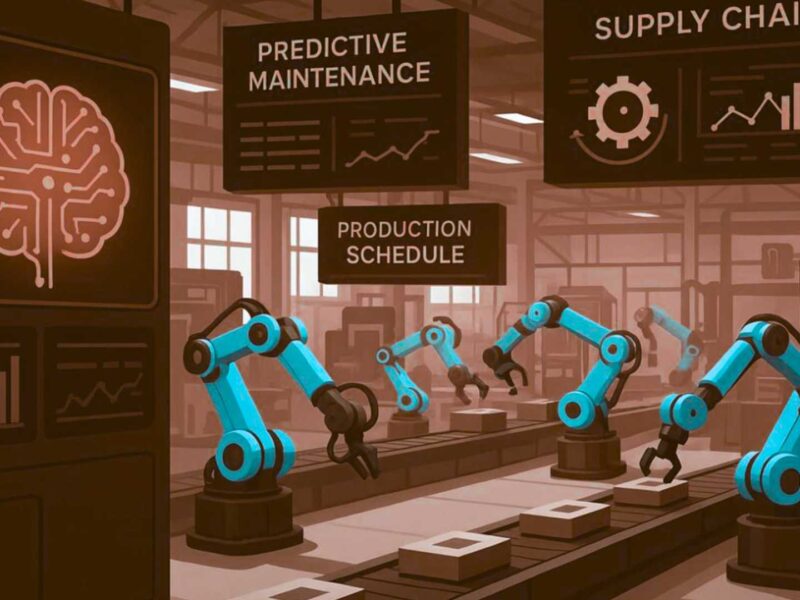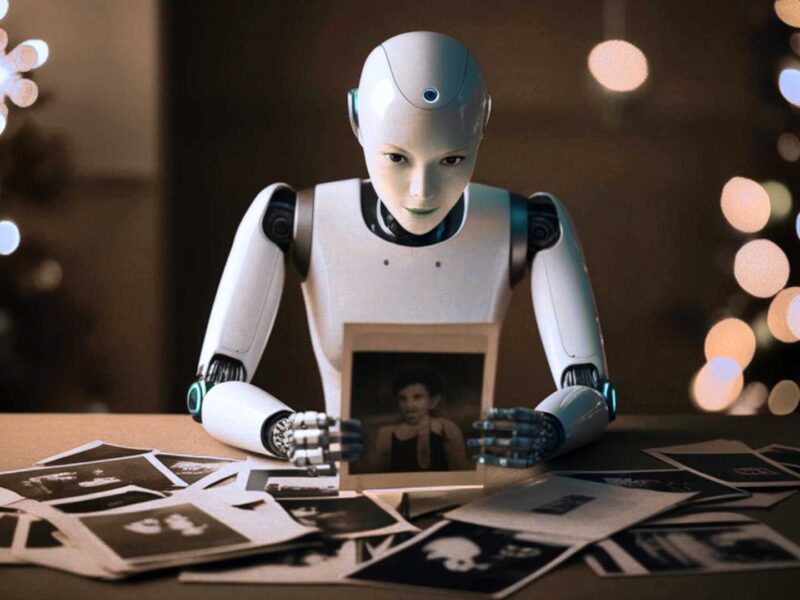AI and the Workforce: Adapting, Reskilling, and Finding New Opportunities
As AI reshapes the job landscape, displacing workers while creating new opportunities, we tapped into the minds of tech visionaries, business trailblazers, and passionate tech enthusiasts to uncover a burning question:
Which industries are flourishing alongside—or even despite—AI’s rise, offering fresh career paths for those impacted?
From surprising growth sectors to the hidden drivers fueling this shift, their insights light the way for a future where humans and tech evolve together.
Read on!
Thriving Industries Include Cybersecurity and Healthcare
Industries that thrive alongside AI–rather than being displaced by it–include cybersecurity, digital marketing, healthcare, skilled trades, and AI ethics/governance.
Cybersecurity: As AI advances, so do cyber threats. Companies need experts in AI-driven threat detection and ethical hacking to protect sensitive data.
Digital Marketing & SEO: AI enhances automation, but human expertise in strategy, creativity, and user intent remains essential–especially in content creation, brand positioning, and SEO.
Healthcare & Biotechnology: AI assists with diagnostics and research, but human oversight, patient care, and medical decision-making will always require skilled professionals.
Skilled Trades (Electricians, Plumbers, Technicians): AI can’t replace hands-on, problem-solving roles that require physical presence and adaptability.
AI Ethics & Governance: As AI adoption grows, businesses need professionals to ensure compliance, fairness, and ethical AI use.
The key drivers behind this evolution include the need for human judgment, regulatory oversight, complex problem-solving, and roles requiring interpersonal skills–areas where AI is an enhancement, not a replacement.

Chris Raulf
Founder & President, Boulder SEO Marketing
Balance Between Automation and Human Expertise
AI is definitely changing the job market, however plenty of industries are still developing alongside it–or maybe due to it. Cybersecurity, healthcare, and renewable energy are expanding as technology advances, but they still need professionals to deal with complex decision-making. Skilled trades like electricians and mechanics aren’t going anywhere either due to the hands-on nature that can’t be easily automated.
On the other hand, fields like mental health, social work, and creative industries continue to thrive because they rely upon human connection, originality, and emotional intelligence–things AI simply can’t replicate.
The biggest factor shaping this shift is the balance between automation and human expertise. Jobs that require critical thinking, ethical judgment, and consideration–like law, finance, and counseling–still need people at the helm.
Even in AI-driven industries, there is a growing demand for those who can work alongside technology rather than competing with it. The key to staying ahead is focusing on skills that AI can’t easily replace, whether that is creativity, problem-solving, or actually the ability to connect with others on a human level.

Vipul Mehta
Co-Founder & CTO, WeblineGlobal
Promising Career Paths in Healthcare and Energy
Industries that are growing alongside–and in some cases, despite–AI’s rapid evolution offer promising alternative career paths for workers displaced by automation. Some of these industries include:
Healthcare & Biotechnology: With increasing digitalization, roles in personalized medicine, telehealth, health data analytics, and biotech R&D are expanding. Human empathy, clinical judgment, and patient care remain irreplaceable by AI.
Renewable Energy & Sustainability: The global shift toward sustainable energy drives growth in solar, wind, and battery technology sectors. Careers in environmental engineering, energy management, and sustainable construction are booming as the world seeks cleaner alternatives.
Cybersecurity: As cyber threats become more sophisticated, the demand for cybersecurity professionals grows. Human oversight, ethical hacking, and strategic security planning are essential and cannot be fully automated.
Education & Upskilling: The need for continuous learning and reskilling creates opportunities in education technology, training, and career coaching. Teaching, curriculum development, and mentorship leverage interpersonal skills that AI cannot replicate
Sam Prakash Bheri
Principal Technical Program Manager, MICROSOFT
Healthcare and Biotech Continue to Grow
Healthcare and biotech continue to grow despite AI, as roles like nursing, physical therapy, and mental health counseling require human expertise. AI enhances diagnostics but cannot replace hands-on patient care. Biotech innovation in personalized medicine and drug discovery is also driving demand for biomedical engineers and clinical researchers.
Renewable energy is expanding due to climate goals, with careers in solar, wind, and electric vehicle infrastructure offering new opportunities. Skilled trades such as electricians, welders, and HVAC technicians remain essential, as automation struggles to replace on-site problem-solving and craftsmanship. Advanced manufacturing jobs in robotics maintenance and 3D printing are also emerging.
Cybersecurity is thriving due to AI-driven threats, creating demand for ethical hackers, security analysts, and compliance experts. Regulations like GDPR and evolving AI laws ensure a steady need for data privacy professionals. The education sector is growing as workforce reskilling and upskilling become critical for adapting to AI disruption.
Creative industries, including music, arts, journalism, and design, still rely on human originality despite AI-generated content. Hospitality, tourism, and luxury services also maintain strong demand, as AI cannot replicate high-end personal experiences. The key drivers of growth include regulatory requirements, human interaction needs, and infrastructure expansion, ensuring viable career alternatives in AI-augmented industries.
Sudheer Devaraju
Staff Solutions Architect, Walmart
Renewable Energy Sector Offers Alternative Career Paths
One industry that’s growing alongside AI, and providing an alternative career path for those displaced by it, is the renewable energy sector.
As automation and AI take over certain manufacturing and service jobs, more people are shifting to green energy careers like solar panel installation, wind turbine maintenance and energy efficiency consulting.
The key drivers for this shift are the growing demand for sustainable energy solutions, government incentives and the global push to reduce carbon emissions.
I’ve seen firsthand workers from traditional sectors like manufacturing or transportation transition into renewable energy roles by upskilling through retraining programs. These industries not only offer stable career paths but also align with the growing trend of environmental awareness.
The future of AI and automation will continue to reshape the workforce but industries like renewable energy are a way to pivot.

Nikita Sherbina
Co-Founder & CEO, AIScreen
Growing Industries Include Healthcare and Cybersecurity
Several industries are experiencing growth alongside or despite AI, offering alternative career paths for workers displaced by automation. These include healthcare, renewable energy, cybersecurity, and the creative industries.
For example, in healthcare, the demand for nurses, care workers, and mental health professionals is increasing as AI supports, rather than replaces, human-centered care. The renewable energy sector is growing rapidly, with roles in solar energy, wind energy, and energy storage becoming increasingly important as the world shifts toward sustainable practices.
Key factors driving this evolution are the need for human empathy, complex problem-solving skills, and creativity–areas where AI cannot easily replace humans.
Additionally, as AI technology advances, there is a growing need for specialized roles in fields like AI ethics, data privacy, and AI implementation. These industries offer opportunities for upskilling and retraining, enabling workers to transition into new roles that complement technological advancements.
Skilled Trades and Healthcare Remain Essential
Several industries continue to expand alongside AI, offering alternative career paths for displaced workers. Skilled trades, including plumbing, electrical work, and welding, remain essential. Automation struggles with hands-on, problem-solving tasks in unpredictable environments.
Healthcare is another area of growth. Demand for nurses, therapists, and medical technicians is increasing due to aging populations. AI enhances diagnostics but cannot replace human empathy and patient care.
The creative sector also adapts. While AI generates content, businesses still need strategists, brand builders, and designers who understand human emotion and cultural shifts.
Renewable energy is expanding rapidly. Solar and wind power require engineers, technicians, and project managers to support infrastructure development. Key drivers of this shift include demographic changes, environmental concerns, and the need for human-centered problem-solving.
As AI reshapes industries, adaptability and specialized skills will determine long-term career stability.

Mike Khorev
Managing Director, Nine Peaks Media
Event Preservation Industry Thrives Alongside AI
The events and event preservation industry is thriving alongside AI and will continue to grow, offering alternative career paths for workers displaced by automation.
AI cannot replace the fundamental human need for real-world connection, community, and shared experiences–nor will it in the near future. Industries centered on organizing gatherings, fostering community, and preserving these experiences are expanding.
Key factors driving this evolution include the irreplaceable value of in-person interaction, the demand for authentic human engagement, and the creative, organizational skills required to execute successful events, which remain beyond AI’s reach.

Shah Dudayev
Founder, Frootful Ventures
Skilled Trades and Healthcare Remain Essential
AI is reshaping industries, but some fields are growing right alongside it, creating strong career opportunities. Skilled trades such as electricians, plumbers, and carpenters remain essential. Hands-on work like wiring a building or crafting custom woodwork requires human expertise.
Healthcare continues to demand professionals who can assess situations with intuition and provide care beyond what AI can offer.
High-touch customer service is another area where technology falls short. Automated responses handle routine tasks, but complex interactions still require human judgment and emotional intelligence. Creative industries are adapting as well. While AI generates content, storytelling, branding, and strategic thinking depend on human creativity.
The strongest careers are those that emphasize skills AI struggles to replicate. People who focus on expertise, adaptability, and problem-solving will always be in demand. The shift is happening, but opportunities are still wide open for those who recognize where their strengths make the most impact.

Alisa Volynets
HR, Career Growth Consultant, SEO for Contractors
Healthcare Sector Expands Due to AI
The rise of AI is reshaping industries, presenting both challenges and opportunities for workers.
While automation replaces certain tasks, sectors like healthcare are expanding due to factors such as an aging population and heightened health consciousness.
Demand for professionals capable of empathy and complex decision-making is increasing, with new roles arising in telehealth, personalized medicine, and patient advocacy.

Mohammed Kamal
Business Development Manager, Olavivo
On behalf of the Techronicler community of readers, we thank these leaders and experts for taking the time to share valuable insights that stem from years of experience and in-depth expertise in their respective niches.
If you wish to showcase your experience and expertise, participate in industry-leading discussions, and add visibility and impact to your personal brand and business, get in touch with the Techronicler team to feature in our fast-growing publication.












